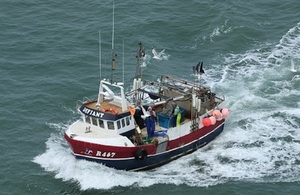Fishing safety legislation ILO 188 - MCA supports industry compliance
ILO 188 legislation came into force a year ago and was brought into law to improve safety and well-being for everyone working on fishing vessels.

Commercial fishing is still the most dangerous profession in the UK with a total of seven lives lost in the UK fleet in 2019.
The Maritime & Coastguard Agency (MCA) is stepping up monitoring of the fishing industry and compliance with ILO 188. The MCA will be taking full advantage of resources and new technology, for example, the use of new fixed-wing aircraft with high quality cameras onboard.
When the aircraft are looking for pollution at sea or helping with search operations, they will also be equipped to observe and report on the operations of fishing vessels which are not complying with UK legislation, for example the wearing of personal flotation devices (PFD) and life jackets on a fishing vessel.
Further guidance can be found at ILO work in fishing convention and ILO 188 for fishermen - how to comply
David Fenner, Head of Fishing Safety at the MCA, said: “Fishing is still the most dangerous profession in the UK today and, whilst we are seeing improvements in safety, tragically there were seven lives lost in the industry last year, all of which could have been prevented. The introduction of ILO 188 at the end of 2018 was a considerable change in the way safety in the industry is managed. These regulations introduced new requirements for the safety and protection of fishers and powers of enforcement where unsafe practices are observed onboard.”
Neil Cunningham, Head of Enforcement at the MCA, went on to say: “The biggest challenge to the MCA in ensuring requirements of regulations are followed has always been that we are unable to see what actually happens onboard a vessel once it leaves port. We will be using new resources including two new fixed-wing aircraft. While they are looking for pollution at sea or helping with searches, they will also give us the opportunity to have a clear sight into what is happening on vessels at sea and where it is clear that legal requirements are not being met (for example, not wearing a PFD) we will take appropriate action to continue to support the industry in improving safety. Appropriate and proportionate action will be considered and that may ultimately result in a prosecution.”